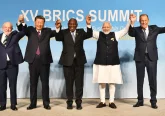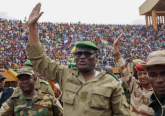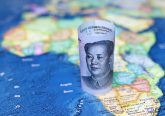 The ongoing International Criminal Court trial into the so-called “Ocampo Six” is a reminder of how raw the violence around the 2007 Kenyan election remains. It now seems likely that the verdicts on the six won’t be announced until next year – until which time Uhuru Kenyatta, one of those accused of inciting ethnic violence, remains in the post of Deputy Prime Minister.
The ongoing International Criminal Court trial into the so-called “Ocampo Six” is a reminder of how raw the violence around the 2007 Kenyan election remains. It now seems likely that the verdicts on the six won’t be announced until next year – until which time Uhuru Kenyatta, one of those accused of inciting ethnic violence, remains in the post of Deputy Prime Minister.
Over 1100 were killed, and had the coalition agreement not come when it did, the spectre of fully-blown Civil War was a genuine possibility. The international community was in shock, having traditionally viewed Kenya as one of the least violent countries in Africa. Really, they shouldn’t have been. A brief history lesson into how Daniel Arap Moi won the 1992 and ’97 elections, after reluctantly introducing multipartism in 1991, tells us there was very little new about violence around an election. Moi was a master of exploiting fault lines in Kenyan politics, as highlighted by the strong-arm tactics of Youth For KANU ’92 in the Rift Valley, which helped him record 67% in the province in the 1992 presidential elections. The mastermind? That would be one William Ruto, who tried to do something similar for Raila Odinga in 2007. He is one of those six who awaits the ICC verdict.
What the example of Ruto sheds light on is how the same men keep exploiting – and exacerbating – divisions for political gain. And quite understandably too: there has been no one to stop them; if it works once, why not again? This is where the ICC case comes in.
If the ICC can bring the six to justice it will serve as a potent symbol that political leaders are not above the law. Moi’s men pursued their tactics – from light harassment to burning the homes of opposition supporters – for two reasons. First, they worked. And second, they knew they could get away with them. Political victory was an end in itself, and would bring rewards of patronage and safety that they would not be brought to account for their crimes.
Cynically one could say that convictions in the ICC will only encourage inciters of ethnic violence to be subtler about how they go about this. Such thinking probably contains some truth, but, nevertheless, the symbolic impact of convictions would be huge. Crucially, amongst the six are members of both main parties in 2007; if men from both sides are convicted, it would make the complaint that one side is being ‘targeted’ much harder to stick.
And the practical element of removing perennial instigators of ethnic violence from Kenyan politics should not be discounted either. After all, Kenyatta and Ruto, if they are not convicted, could well face each other in the 2012 presidential elections. For Kenya’s sake, the hope is they will be behind bars instead.
Tim Wigmore is a History and Politics student at Trinity College, Oxford.







1 Comment
While the argument that the ICC proceedings against the Kenyan suspects acts as a deterrent to impunity in political violence may be valid, the assertion that the process may also serve to ‘remove’ instigators of violelence from the political scene may be far fetched.
Uhuru Kenyatta, who continues to serve as the country’s deputy Prime Minister and occupies the powerful finance ministry, has just been decalred by Forbes magazine as the richest man in Kenya and ranked 26th wealthiest African. His political clout and influence cannot be underestmated. He ejoys the support of President Mwai Kibaki from the populous Kikuyu ethnic group as his apparent heir. Furthermore, Uhuru has declared that whether the charges against him at the ICC are confirmed or not, he would still run for the presidency in 2012.
His co-accused, William Rutto, who holds sway in the expansive Rift-Valley province has also affirmed his intention to vie for the country’s top seat despite the Hague proceedings and has promised to delay the confirmation process with numerous apeals.
However reprehensible, the facts on the ground supported by periodic opinion polls indicate that both Rutto and Uhuru enjoy massive grass-roots support among the Kenyan electorate. They further claim that the country’s new constitution would not bar them from running for office unless and until they are found guilty- this could be a long way off judging by the speed of the ICC trials so far. A joint presidential ticket featuring the two with the backing of seven of the major tribes in Kenya (the G7 alliance already mooted) would be an almost unstoppable force in Kenyan politics.
My analysis as a Kenyan political scientist and keen observer is that the reality on the ground is much more complicated and less predictable than such neat analyses as this blog may suggest.